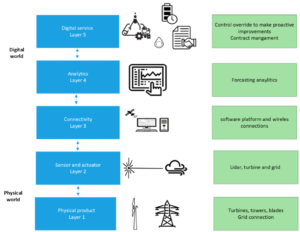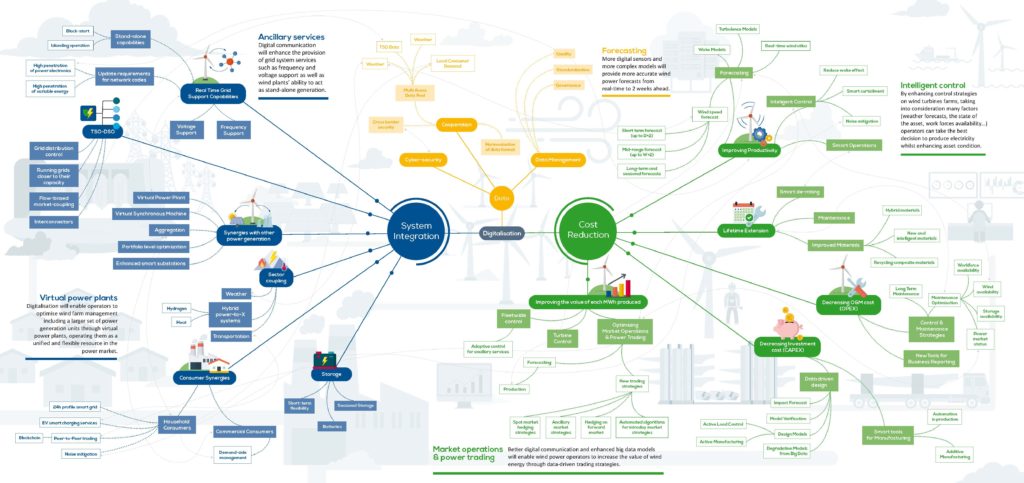How to patent digital business models in the renewable energy industry? A case study from MECAL: “When Wind Goes Digital”
New research project at the MIPLM: Digitalization of the wind turbine industry – it continues to grow at rapid speed. Many competitors in the market are promoting new services that come from the interconnectivity and digitalization of individual hardware. By adding sensors and actuators to standard hardware they can create additional data sources and inputs. Once these are connected all the data sources can be analyzed for a final digital service that meets customer needs. However, the quick shift to digital solutions comes with some hesitation as too much data collection by inexperienced companies create concern about quality and security. Therefore, by implementing a 360° IP strategy companies in the wind turbine business, like MECAL, can create a unique market position and create exclusivity with digital business cases that can be secured with IP protection.
 Digitalization is already playing a major role in the growth of wind energy, but it can still drive further improvements in operational efficiency, decision making and cost efficiency. The wind industry is widely expected to become an ever-greater contributor to the world’s future energy mix. A 15-fold escalation in wind-powered generation from 1.1 PWh in 2018 to 17 PWh in 2050 is forecasted by industry experts. In terms of installed electricity generation capacity, the amount of wind energy will increase more than 8 times by 2050 to 5TW globally.
Digitalization is already playing a major role in the growth of wind energy, but it can still drive further improvements in operational efficiency, decision making and cost efficiency. The wind industry is widely expected to become an ever-greater contributor to the world’s future energy mix. A 15-fold escalation in wind-powered generation from 1.1 PWh in 2018 to 17 PWh in 2050 is forecasted by industry experts. In terms of installed electricity generation capacity, the amount of wind energy will increase more than 8 times by 2050 to 5TW globally.
Digital technologies have been one of the key reasons behind wind power’s growth to date. Digitalization will also be vital in achieving the wind energy industry’s ambitious future growth targets. In particular, the industry considers improving operational efficiency (identified by 52% of respondents), decision making (42%) and cost efficiency (40%) as the top priorities for further digitalization. The wind industry already uses vast amounts of data to improve performance, for example exploiting wind farm SCADA (Supervisory control and data acquisition) data to enable a predictive approach by anticipating faults and planning maintenance in order to ensure greater up-time. This increased reliance on data brings new challenges and the wind industry faces conflicting priorities when it comes to data sharing. While the benefits to sharing are clear, there is also an essential requirement to protect competitive advantage and intellectual property. Finding the balance will allow the wind industry to unlock a bright digital future.
This research project was conducted by MIPLM graduate Nicky Wennemer and supervised by Prof. Dr. Alexander Wurzer and Dr. Thibaud Lelong both CEIPI.
 Nicky Wennemer is the Legal Counsel for MECAL Corporate Management B.V., where she oversees and coordinates all legal aspects including IP development, contract negotiation and legal risk management. MECAL is a global enterprise with more than 30 years engineering expertise in the Wind Energy Sector and Semiconductor industry.
Nicky Wennemer is the Legal Counsel for MECAL Corporate Management B.V., where she oversees and coordinates all legal aspects including IP development, contract negotiation and legal risk management. MECAL is a global enterprise with more than 30 years engineering expertise in the Wind Energy Sector and Semiconductor industry.
After completing her Bachelor’s degree in International Studies-Economics from University of California, San Diego, Nicky decided to focus her career on Energy Management and moved to Europe. Working for an international company like MECAL allowed her to combine her passion of culture, economics, and law. She continued her education by graduating Magna Cum Laude with a Master of Science in Law. This foundation of law combined with the passion for business development led her to explore the impact of intellectual property combined with the right management within MECAL, which eventually led her to the MIPLM program.
Nicky is also a member of the Licensing Executives Society (LES) Benelux and ICC Institute of World Business Law.
Here is the presentation about the “A 360° IP Strategy For A Digital Business Case Within A Wind Turbine Business”:




